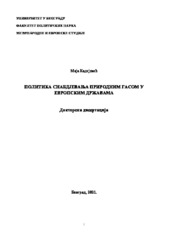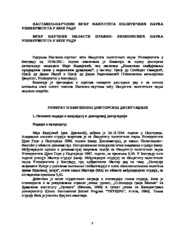Приказ основних података о дисертацији
Политика снабдјевања природним гасом у европским државама
Natural gas procurement policies of the European states
| dc.contributor.advisor | Đorđević, Snežana | |
| dc.contributor.other | Samardžić, Slobodan | |
| dc.contributor.other | Nadić, Darko | |
| dc.contributor.other | Radosavljević, Darko | |
| dc.creator | Kadijević, Maja | |
| dc.date.accessioned | 2021-12-22T14:38:50Z | |
| dc.date.available | 2021-12-22T14:38:50Z | |
| dc.date.issued | 2021-09-30 | |
| dc.identifier.uri | http://eteze.bg.ac.rs/application/showtheses?thesesId=8435 | |
| dc.identifier.uri | https://fedorabg.bg.ac.rs/fedora/get/o:24727/bdef:Content/download | |
| dc.identifier.uri | http://vbs.rs/scripts/cobiss?command=DISPLAY&base=70036&RID=52974601 | |
| dc.identifier.uri | https://nardus.mpn.gov.rs/handle/123456789/18850 | |
| dc.description.abstract | Основни предмет истраживања ове дисертације представља анализа политика снабдјевања природним гасом европских држава, укључујући чланице ЕУ и оне које то нису, као и анализа улоге државе као креатора политика у овом процесу. Анализирана је једна од најважнијих секторских политика ЕУ у последње вријеме, енергетска политика, као и енергетска политика Русије као највећег снабдјевача природним гасом у Европи, али и осталих земаља Европе, које, независно од тога да ли се придружују или иступају из ЕУ, узајамно утичу на односе и процесе на европском енергетском тржишту. Крајњи циљ овог истраживања је дефинисање начина креирања политике набавке гаса у европским земљама са аспекта тржишних и институционалних фактора који је условљавају. У коначници ћемо са аспекта теорија јавних политика утврдити у којој мјери су наведене политике набавке природног гаса у крајњој линији најбоље могуће решење за грађане и адекватан одговор на растућу потражњу за овим енергентом. Општа хипотезa ове дисертације може се сажети кроз премису да у савременим економским условима на нејединственом тржишту гаса, уз стално флуктуирање цијене овог енергента, упркос тенденцијама институција Европске уније и Енергетске заједнице да успоставе јединствено енергетско тржиште – енергетска политика и даље остаје питање од стратешког националног интереса и под директном ингеренцијом држава. Консолидовање енергетских интереса држава чланица ЕУ и европских држава уопште, представља спор и постепен процес, који своје успјехе и помаке у енергетској интеграцији постиже једино у периодима енергетских криза и наглих прекида снабдјевања на тржишту. У раду ћемо анализирати искључиво формалне актере и њихов утицај на креирање политике набавке гаса, јер у случају енергетске политике као релативно младе и од скоро тек структурно дефинисане секторске политике, ово питање остало је недовољно анализирано, док други аспекти анализе још увијек нису ни дефинисани. Тако је кључно истраживачко питање на које покушавамо да дамо одговор у овом раду: Како су регулисане политике набавке гаса у европским земљама и зашто и поред јасног институционалног оквира за креирање политика набавке гаса на нивоу ЕУ и Енергетске заједнице (ЕЗ) и даље имамо одступања од те политике на нивоу билатералних уговора европских држава са Русијом? Након уводних разматрања у првом поглављу, те приказа опште и посебних хипотеза истраживања, у другом поглављу ове дисертације обрађени су различити теоријски приступи процесу креирања и спровођења политике снабдјевања природним гасом. У Трећем поглављу анализирано је актуелно стање на тржиштима природног гаса, трендови и историја снабдјевања европских држава, као и могућност институционализације глобалних енергетских односа. Питање снабдјевања природним гасом у самој ЕУ обрађено је у оквиру Четвртог поглавља, при чему је посебно размотрен институционални оквир њене енергетске политике, процес доношења одлука у гасном сектору и улога институција ЕУ као кључних актера у овим процесима. У Петом поглављу анализиран је гасни сектор Русије, као највећег произвођача природног гаса за европска тржишта, његов институционални, економски и политички оквир ради бољег разумијевања извозне политике и политике производње у сектору природног гаса. У оквиру Шестог поглавља размотрена су питања снабдјевања природним гасом у европским државама које нису чланице ЕУ, стање у секторима природног гаса, тржишни изазови и проблеми са којима се ове државе суочавају, са посебним освртом на лошу узајамну инфраструктурну повезаност овог региона. | sr |
| dc.description.abstract | The main subject of the following dissertation represents the analysis of the natural gas procurement policies of the European states, including EU member states, as well as other European states. Within this subject, we particularly focus on the role of the state in this process. Therefore, we analyze the most important policy in EU recently – as energy policy is famous for, as well as the energy policy of the biggest natural gas supplier in Europe – Russia, but also the other states which, regardless of being EU candidates or not, equally influence these processes on energy markets. The final goal of the following analysis is to determine the model of creating the natural gas procurement policy in European states from the position of institutional and market factors they depend on. Based on theories of public policies, one of the final goals is to check how these policies really answer the needs of final costumers and growing demand for natural gas on energy markets. General hypothesis contains the premise that under current economic conditions on the non-unique natural gas market of constantly fluctuating gas prices, energy policy remains the question of strategic national interest and under dominant state control, despite the tendencies of EU and European Community to establish a common energy market. Consolidation of states’ energy interests is a quite slow and gradual process itself, which gains certain success exclusively during hard energy crises and sudden interruptions of supply processes. In the following dissertation we exclusively analyze formal actors and their influence on the process of procurement policy creation, as this question remains insufficiently analyzed so far within related literature, while some of its aspects are not even defined properly. So, the key research question is: How are the natural gas procurement policies regulated within European states and why, in spite of clear institutional frame for these policies within EU and European Community, we still have exceptive behavior of some of those members over their bilateral agreements with Russia? Following the Introduction part and presentation of the general and specific hypotheses, within Second chapter we analyze different theoretical approaches to the process of creating and implementing procurement policy. The current conditions on natural gas market, current trends and history of procurement policies of European states, as well as possibility of institutionalization of the global energy relations are being analyzed within the Third chapter. Procurement policy of the European states, particularly institutional frame of the EU energy policy and decision making process in gas sector itself are being explored within the Fourth chapter. In the Fifth chapter we examine the gas sector of Russia, as the biggest natural gas producer and supplier in European market so far, as well as institutional, economic and political conditions that influence the producing and export policy of this country. Within the Sixth chapter, we analyze procurement policies in the European states that are not members of the EU, the condition of their gas sectors, market challenges and problems they face with, with special focus on underdeveloped infrastructural connection among them. This chapter also contains three specific case studies, including Norway, as an example of successfully structured gas policy, Great Britain as an example of country that has left common energy market of EU and, finally, Turkey, for its geographical position that provides her exclusive procurement benefits and other economic and political advantages, as a result of different pipeline projects ongoing in this country. | en |
| dc.format | application/pdf | |
| dc.language | sr | |
| dc.publisher | Универзитет у Београду, Факултет политичких наука | sr |
| dc.rights | openAccess | en |
| dc.rights.uri | https://creativecommons.org/licenses/by-nc-nd/4.0/ | |
| dc.source | Универзитет у Београду | sr |
| dc.subject | енергетска политика | sr |
| dc.subject | policy of natural gas procurement | en |
| dc.subject | политика снабдјевања природним гасом | sr |
| dc.subject | јавне политике | sr |
| dc.subject | политика диверзификације | sr |
| dc.subject | формални креатори политика | sr |
| dc.subject | ЕУ | sr |
| dc.subject | Русија | sr |
| dc.subject | балканске државе | sr |
| dc.subject | Енергетска унија | sr |
| dc.subject | Енергетска заједница | sr |
| dc.subject | енергетска безбједност | sr |
| dc.subject | гасна тржишта | sr |
| dc.subject | политика производње | sr |
| dc.subject | извозна политика | sr |
| dc.subject | тржишне реформе | sr |
| dc.subject | гасне компаније | sr |
| dc.subject | цјеновна политика | sr |
| dc.subject | energy policy | en |
| dc.subject | diversification policy | en |
| dc.subject | formal policy creators | en |
| dc.subject | public policy | en |
| dc.subject | EU | en |
| dc.subject | Russia | en |
| dc.subject | Balkan states | en |
| dc.subject | Energy union | en |
| dc.subject | Energy community | en |
| dc.subject | energy security | en |
| dc.subject | natural gas markets | en |
| dc.subject | producing policy | en |
| dc.subject | export policy | en |
| dc.subject | market reforms | en |
| dc.subject | pricing policy | en |
| dc.title | Политика снабдјевања природним гасом у европским државама | sr |
| dc.title.alternative | Natural gas procurement policies of the European states | en |
| dc.type | doctoralThesis | |
| dc.rights.license | BY-NC-ND | |
| dcterms.abstract | Ђорђевић, Снежана; Надић, Дарко; Радосављевић, Дарко; Самарджић, Слободан; Кадијевић, Маја; Politika snabdjevanja prirodnim gasom u evropskim državama; | |
| dc.identifier.fulltext | http://nardus.mpn.gov.rs/bitstream/id/78538/Disertacija_11978.pdf | |
| dc.identifier.fulltext | http://nardus.mpn.gov.rs/bitstream/id/78539/Izvestaj_Komisije_11978.pdf | |
| dc.identifier.rcub | https://hdl.handle.net/21.15107/rcub_nardus_18850 |



